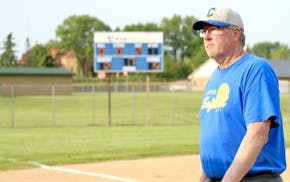For nearly four years, B. Todd Jones was one of the nation's top law enforcement officers, overseeing the Department of Alcohol, Tobacco, Firearms and Explosives (ATF), which had key responsibilities in the investigations of some of the nation's most horrific crimes. Among them were the mass shootings in Aurora, Colo., and Newtown, Conn., and the bombing at the Boston Marathon.
Compared to that, Jones' current assignment might be considered fun and games — actually one game in particular, football.
His title now is special counsel for conduct for the National Football League.
"For a lifelong football fan, it's a dream come true," said Jones, who still has a home in the Twin Cities, where he spent two stints as U.S. attorney (1998-2001 and 2009-13) in addition to leading the national ATF (2011-15). He quipped: "When I watch football on Sunday now, and my wife says, 'What are you doing?' I say I am working."
Jones was ATF director when he was approached by a headhunter for the NFL about his possible interest in the job. He said he knew his days at the ATF were numbered because it was a political appointment that would end when President Obama left office.
At the time Jones was approached by the NFL, the league was under criticism for its handling of several major incidents involving NFL players — domestic assault charges against players Ray Rice and Greg Hardy and a child abuse charge against the Vikings' Adrian Peterson.
"Those three cases were sort of the underpinning of why this position was created," Jones said. "There was a recognition that they needed someone with the experiences I had, my familiarity with the criminal justice system, someone who had done internal investigations in the private sector, who could help expand the code of conduct, which was on paper but not reflected in how the clubs operate."
The three cases had largely run their course when he came on board.
Jones' focus has been off-the-field conduct and he spends much of his time on "proactive measures" that include encouraging mentoring and offering his advice to players on subjects like violence and social media.
He recalled addressing 200 rookies at the annual rookie symposium. "I was struck by how young they are," he said. "They are just kids. … They sign contracts for a lot of money. There are a lot of people around them who want something — from money to time."
Jones said that when he goes to a game, "it's not as a fan, it's to work." He checks in with security personnel and schmoozes with club officials.
Jones accompanied NFL Commissioner Roger Goodell to the Vikings' playoff game against Seattle. As an NFL official, he said he must keep his cheering in check.
Goodell had to catch a plane to New York, so during the last quarter of the game, they were in a car heading to the airport and listening on the radio. Jones said he listened in disbelief as Vikings place-kicker Blair Walsh missed the field goal that could have won the game. "It was a long flight back to New York," Jones said.
Still, he believes the Vikes had a successful season. "The Vikings will be in the playoffs for the next couple of years if they stay healthy," Jones said.
Randy Furst • 612-673-4224

This St. Paul native now goes by Kandi Krush, and she body-slams her opponents in the ring
Man agrees to 6-year sentence for fatally shooting Hopkins man on edge of downtown Minneapolis

